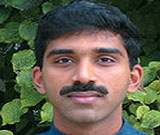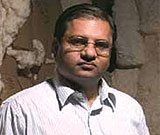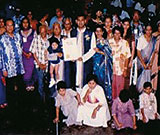|
TAMIL DIASPORA
|
 US
US
|
KARTHIK SANKARANARAYANAN, a doctoral student, is helping develop a surveillance software that will tell whether a person on the street is acting suspiciously or appears to be lost. Intelligent video cameras, large video screens and geo-referencing software are
amo ng the technologies that will soon be available to law enforcement and security agencies. ng the technologies that will soon be available to law enforcement and security agencies.
"We've always tried to develop technologies that would improve officers' situational awareness, and now we want to give that same kind of awareness to computers," said James W. Davis, an associate professor of computer science and engineering at Ohio State University.
Davis and Sankaranarayanan said: "In our research, we care what you do, not who you are. We aim to analyse and model the behaviour patterns of people and vehicles moving through the scene, rather than attempting to determine the identity of people.
"We are trying to automatically learn what typical activity patterns exist in the monitored area, and then have the system look for atypical patterns that may signal a person of interest - perhaps someone engaging in nefarious behaviour or a person in need of help."
Sankaranarayanan is expected to get his PhD on Thermal Modelling and Management from University of Virginia, Charlottesville.
|
|
|
 UK
UK
|
 SESHADRI
RAMKUMAR, and other researchers at the Institute of Environmental and Human Health at the Texas Tech Varsity are leading the battle against chemical warfare. SESHADRI
RAMKUMAR, and other researchers at the Institute of Environmental and Human Health at the Texas Tech Varsity are leading the battle against chemical warfare.
As part of a study to develop a system to counter biological terror attacks, the Nonwoven dry wipe product
'Fibertec' was developed as part of a study by the Lawrence Livermore National Lab, using mustard gas and other toxic chemicals.
Professor Ramkumar supervises the Nonwovens and Advanced Materials Lab at Texs Tech and with the Admiral Elmo R. Zumwalt Jr National Programme for Countermeasures to Biological and Chemical Threats, worked to create the product that will be an asset to military and homeland security efforts in the post 9/11 environment.
Fibertec was developed at a critical time, when a Congressionally mandated study warned that a chemical-biological attack is expected in the world in the next five years.
Results of the study are published online in the American Chemical Society's journal, Industrial & Engineering Chemistry Research and is entitled 'Next Generation Non-particulate Dry Nonwoven Pad for Chemical Warfare Agent Decontamination'.
|
|
|
TAMIL DIASPORA
|
 Malaysia
Malaysia
|
D. JEYAKUMAR is fighting accusations that he had exploited children for political mileage. The Malaysian Indian lawmaker says he would write to the Sultan of Selangor state to clarify that those who participated in his bicycle campaign had actually gained in exposure and experience.
Jeyakumar has been accused of including below-18 children in the bicycle campaign organised by his Jaringan Rakyat Tertindas from the northern and southern states to Kuala Lumpur. "Even my 15-year-old child is involved in the campaign," he says.
He said the children had learnt about the lifestyle of the local communities in the areas they visited. Jeyakumar says people are spreading inaccurate information about him.
A. THANABALAN, who traces his roots to Karaikal in south India, is planning an association of 1,700 of his relations across the globe, taking his inspiration from Scottish and Chinese clans. The idea is to meet and savour the ties that have been lost over decades and help out the needy, says Thanabalan, whose ancestors came to Malaysia over a century ago.
"It's not just for bonding, but to encourage whole-hearted participation to benefit others," said Thanabalan, 76, the great-grandson of Muthu Ramalingam Pillay and Marimuthu Ammal, who came to Malaysia a century ago.
"We will focus on education, welfare and culture. But we will not be too clannish. We can also help others," he said.
The idea is that the family members would help each other out in an emergency, like a surgery, or contribute to a scholarship fund. The gathering is called the "Bandham", the Sanskrit word for bonding. or contribute to a scholarship fund. The gathering is called the "Bandham", the Sanskrit word for bonding.
A website bandham.weebly.com was also launched to spread the latest news about the family.
Thanabalan, who began his research after he retired from teaching in Penang, said there are now seven generations of descendants living in Penang, Taiping and Kuala Lumpur, and in Canada, Australia, New Zealand, Nigeria, Germany, the US and, of course, India.
S. SUBRAMANIAM, Malaysia's human resource minister says the Malaysian government is prepared to arrange the training of ethnic Indian youths to become temple priests.
Temple priests have traditionally come from India, but visa and job restrictions have resulted in shortages.
Subramaniam, who is also the secretary-general of the Malaysian Indian Congress, says many temples were facing a shortage of priests to conduct daily prayers and were now seeking to recruit more priests from India.
But he said it was more important for the current batch of youngsters to be trained as priests so that they could continue to disseminate Indian culture and traditions to the future generation.
|
|
|
|
|
|